|
Books Should Be Free Loyal Books Free Public Domain Audiobooks & eBook Downloads |
|
|
Books Should Be Free Loyal Books Free Public Domain Audiobooks & eBook Downloads |
|
Historical Fiction |
|---|
|
Book type:
Sort by:
View by:
|
By: Howard Pyle (1853-1911) | |
|---|---|
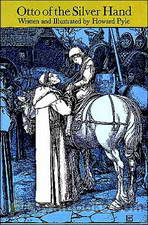 Otto of the Silver Hand
Otto of the Silver Hand
The story of little Otto, a gentle, peace-loving child born into the heart of turmoil and strife in the castle of a feuding robber baron in medieval Germany. (Summary by Arctura) | |
 Howard Pyle's Book of Pirates
Howard Pyle's Book of Pirates
Swashbuckling tales of legendary pirates, buccaneers, and marooners, terrors of the Spanish Main. | |
By: Hugh Walpole (1884-1941) | |
|---|---|
 Cathedral
Cathedral
Sir Hugh Seymour Walpole, CBE (1884 – 1941) was an English novelist. He was the son of an Anglican clergyman, intended for a career in the church but drawn instead to writing. Among those who encouraged him were the authors Henry James and Arnold Bennett. His skill at scene-setting, vivid plots, and high profile as a lecturer brought him a large readership in the United Kingdom and North America. He was a best-selling author in the 1920s and 1930s, but has been largely neglected since his death... | |
 Gods and Mr Perrin
Gods and Mr Perrin
The book is probably better known under the title ‘Mr Perrin and Mr Traill’, later made into a well-known film in 1948. Perrin and Traill are masters at a grim old-fashioned second-rate boarding public school in Cornwall – Perrin has been there many years and the youthful Traill has just arrived. The book concerns the growing antagonism between the two which turns into active dislike following an unfortunate incident and which eventually has devastating consequences. The author vividly captures the dreadful nature of such a cloistered society and the stultifying effect it has on the pupils, their teachers and the other adults in the community. - Summary by Simon Evers | |
 Green Mirror
Green Mirror
Three generations of the Trenchard family, ruled over by the indomitable Mrs Trenchard, live together in comfortable domesticity until Katherine, the favourite daughter, meets and falls in love with Philip, back from some years in Russia, who threatens the whole stability of the family set up by thinking that he can marry her and thus take her away from them all. Philip and Katherine agree reluctantly to postpone their marriage for a full year. During this year, the family begins to splinter as more about Philip and his past becomes known. With considerable humour, the book follows the ups and downs of the family relationships as the year progresses. | |
By: Irving Bacheller (1859-1950) | |
|---|---|
 Eben Holden - A Tale of the North Country
Eben Holden - A Tale of the North Country
Eben Holden - A Tale of the North Country. Having lost both parents and his home in northern Vermont, orphan Willie Brower is taken in by Eben Holden, "Uncle Eb" who transports him westward to save him from being sent to an orphanage. Through the Adirondacks and into the St. Lawrence valley they travel. Eben is kind, happy, and loves to tell stories to the youngster, many of which were to shape the life and ideals of Willie during his life.This story follows Willie as a young orphan, later as a journalist, and finally as a soldier who enlists in the army at the outset of the American Civil War... | |
By: Isabella Varley Banks (1821-1897) | |
|---|---|
 Manchester Man
Manchester Man
Jabez Clegg, the Manchester man, floats into this historical novel in 1799, carried downstream by the River Irk in flood. Jabez's rise to commercial success mirrors the rise of the city at the heart of the industrial revolution. Mrs George Linnaeus Banks (nee Isabella Varley) weaves a web of historical fact and fiction in a fast-paced story built around the rivalry between the Jabez and his nemesis Laurence Aspinall, and the fate of Augusta Ashton, who is loved by both but loves only one. An entertaining fictional journey through the early 19th century history of the city of Manchester, the book also has serious points to make about women's choices and domestic violence. | |
By: Israel Zangwill (1864-1926) | |
|---|---|
 Children of the Ghetto
Children of the Ghetto
In this 1892 novel of London's Jewish East End, Israel Zangwill sets the apparently irrational and decidedly indecorous religious practices of transplanted eastern European Jews against the forces of assimilation. Zangwill's knowledge of Yiddishkeit and skill in melodrama created a series of unforgettable vignettes that had a significant effect on the public perception of this much stigmatized immigrant group. Israel Zangwill (1864-1926) was born in London of Russian and Polish parents. He coined the term cultural "melting pot". | |
By: Ivan S. Turgenev (1818-1883) | |
|---|---|
 On the Eve
On the Eve
On the Eve appeared in 1860, two years before Fathers and Sons, Turgenev's most famous novel. It is set in the prior decade (by the end of the novel, the Crimean War (1853-56) has already broken out. It centers on the young Elena Nikolaevna Stakhov, daughter of Nikolai Arteyemvitch and Anna Vassilyevna Stahov. Misunderstood by both her parents (Nikolai Artemyevitch is at least as interested in his German mistress as in members of her family) she is on friendly terms with both the would-be professor Andrei Petrovitch Bersenyev and the rising young sculptor Pavel Yakovitch Shubin, both of whom might be -- or might not be -- in love with her... | |
By: Ivan Turgenev (1818-1883) | |
|---|---|
 Virgin Soil Volume 1
Virgin Soil Volume 1
Turgenev's last and longest novel presents the story of a group of young people in late nineteenth century Russia, who because of disillusionment with the country's entrenched traditional hierarchies and power relationships, seek to foment revolutionary activity especially among the peasant and working classes, pursuing a Populist "cause". The novel throws together some disparate personalities, from aesthetes to aristocracy to works managers to fools, and exposes the real human emotions and tensions generated by the cause. The publication being read is divided into two volumes; this first one includes Chapters 1-20, approximately half the book. Volume 2 is catalogued separately. | |
 Virgin Soil Volume 2
Virgin Soil Volume 2
The second volume of Turgenev's last novel sees social change bubbling up into conflict with the established order and interacting with the fates of the characters, testing their resolve and motivations to the limit. The publication being read is divided into two volumes; the first one includes Chapters 1-20, approximately half the book, and is catalogued separately. This recording is Volume 2, including chapters 21-38. | |
By: J. M. Barrie (1860-1937) | |
|---|---|
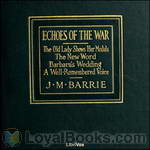 Echoes of the War
Echoes of the War
Short stories with dramatic parts about civilian life in London during the First World War. Some humorous moments. By the author of "Peter Pan". | |
By: J. Thomas Warren | |
|---|---|
 Northern Spy
Northern Spy
The Northern Spy, written in the 1800s, is a lively story about a Union soldier who infiltrates a Confederate battalion in order to aid in the conquering of South Carolina. The novel was very popular, so much so that allegedly Northern Spy apples were named for the hero of the story. - Summary by A. Gramour | |
By: J. Walker McSpadden (1874-1960) | |
|---|---|
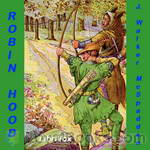 Robin Hood
Robin Hood
Robin Hood is a heroic outlaw in English folklore. A highly skilled archer and swordsman, he is known for "robbing from the rich and giving to the poor", assisted by a group of fellow outlaws known as his "Merry Men". Traditionally Robin Hood and his men are depicted wearing Lincoln green clothes. The origin of the legend is claimed by some to have stemmed from actual outlaws, or from ballads or tales of outlaws. | |
By: Jack London (1876-1916) | |
|---|---|
 When God Laughs, and Other Stories
When God Laughs, and Other Stories
This collection of Jack London's short stories touches on a variety of topics, from his love of boxing, to relationships between criminals, to the trials of life and travel on many frontiers, to an allegory about a king who desired a nose. London is considered a master of the short story, a form much more to his liking and personality than his novels. He was active and quick of mind and the short story suited him well. | |
By: Jacob Abbott (1803-1879) | |
|---|---|
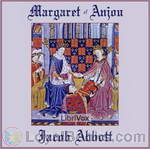 Margaret of Anjou
Margaret of Anjou
Margaret of Anjou, wife of England’s Henry VI, played a key role in launching the storied War of the Roses – the 30-year civil conflict fuelled by the Lancasters and the Yorks, each vying for the British throne in the 15th century. (Summary by Cathy Barratt.) | |
By: James Baikie | |
|---|---|
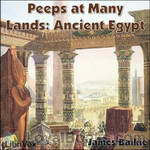 Peeps at Many Lands: Ancient Egypt
Peeps at Many Lands: Ancient Egypt
Written primarily for children, James Baikie’s ‘peep’ at ancient Egypt is a really well done, historical account of the ways of that fascinating land so many years ago. It has stood well the test of time, being both well researched and well written. It’s a fun book for everyone, and families especially will enjoy listening together. | |
By: James Driscoll | |
|---|---|
 The Brighton Boys in the Radio Service
The Brighton Boys in the Radio Service
The Brighton Boys in the Radio Service is a boys adventure story set in WWI – Three College Chums join the military and face the perils of spies, submarines and enemy soldiers in the trenches of embattled Europe. An engaging story set in a period where good guys wore white hats, bad guys wore black hats and every chapter ends with a cliffhanger so you have to come back for more! | |
By: James Fenimore Cooper (1789-1851) | |
|---|---|
 The Last Of The Mohicans
The Last Of The Mohicans
The Last of the Mohicans is an epic novel by James Fenimore Cooper, first published in January 1826. It was one of the most popular English-language novels of its time, and helped establish Cooper as one of the first world-famous American writers.The story takes place in 1757 during the French and Indian War, when France and Great Britain battled for control of the American and Canadian colonies. During this war, the French often allied themselves with Native American tribes in order to gain an advantage over the British, with unpredictable and often tragic results. | |
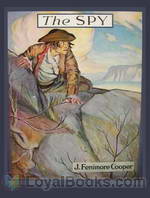 The Spy
The Spy
Between 1865-73 the tumultuous American Revolution rages on in different battlefields. The air is thick with hatred and suspicion as the Continental and British armies clash in bloody warfare. In Westchester County, New York, an area is considered a neutral ground for both forces, Harvey Birch plies his dangerous mission. An innocuous peddler by day, he is in fact an American spy, though he does nothing to correct anyone who assumes he is a British spy. In a magnificent country mansion, The Locusts, live the wealthy Whartons... | |
 The Pathfinder
The Pathfinder
Natty Bumppo goes by many names: La Longue Carabine, Hawk Eye, Leatherstocking, and in this tale, The Pathfinder. Guide, scout, hunter, and when put to it, soldier, he also fills a lot of roles in pre-Revolution upstate New York. An old friend, Sergeant Dunham of the 55th Regiment of Foot, asks him to guide his daughter through the wilderness to the fort at Oswego where Dunham serves. With the French engaging native Indian allies against the British and the Yankee colonists, such a journey is far from safe... | |
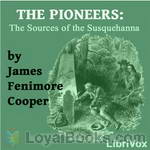 The Pioneers
The Pioneers
The Pioneers: The Sources of the Susquehanna; a Descriptive Tale is one of the Leatherstocking Tales, a series of five novels by American writer James Fenimore Cooper. The Pioneers was first of these books to be published (1823), but the period of time covered by the book (principally 1793) makes it the fourth chronologically. (The others are The Deerslayer, The Last of the Mohicans, The Pathfinder, and The Prairie.)The story takes place on the rapidly advancing frontier of New York State and features... | |
 Prairie - A Tale
Prairie - A Tale
The story opens with Ishmael, his family, Ellen and Abiram slowly making their way across the virgin prairies of the Midwest looking for a homestead, just two years after the Louisiana Purchase, and during the time of the Lewis and Clark Expedition. They meet the trapper (Natty Bumppo), who has left his home in New York state to find a place where he cannot hear the sound of people cutting down the forests. In the years between his other adventures and this novel, he tells us only that he has walked all the way to the Pacific Ocean and seen all the land between the coasts (a heroic feat, considering Lewis and Clark hadn’t yet completed the same trek). | |
 Heidenmauer; or, The Benedictines. A Legend of the Rhine
Heidenmauer; or, The Benedictines. A Legend of the Rhine
This is a story that is set in 16th century Germany. Characters representing the various classes of the remnants of feudalism and the rising bourgeois class struggle against each other. Placed in the light of the very recent and polarizing Protestant Reformation, the characters' tensions increase. - Summary by Joel Kindrick | |
By: James Oliver Curwood | |
|---|---|
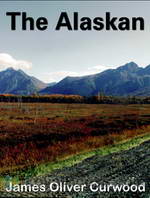 The Alaskan
The Alaskan
This story opens with a young woman who voyages alone into the wilds of Alaska to escape her tragic past. It then continues on to a young man who passionately protects the pristine environment, people and way of life in this snowbound country. Finally, a greedy profiteer arrives in the narrative whose only aim is to fill his pockets. When these three characters encounter each other on the stark and snowy plains, it's a clash of ideals and the sparks begin to fly. The Alaskan by James Oliver Curwood is one of his very engaging adventure romance conservationist stories and was an instant bestseller, like most of his books, when it was first published in 1923... | |
 God's Country—And the Woman
God's Country—And the Woman
James Curwood wrote many adventures of the far north. By 1909 he had saved enough money to travel to the Canadian northwest, a trip that provided the inspiration for his wilderness adventure stories. The success of his novels afforded him the opportunity to return to the Yukon and Alaska for several months each year that allowed him to write more than thirty such books. The Canadian North is often referred to as “God’s Country” God’s Country is a tale of adventure, mystery and romance! | |
By: James Otis (1848-1912) | |
|---|---|
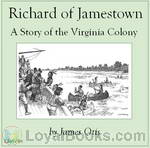 Richard of Jamestown: A Story of the Virginia Colony
Richard of Jamestown: A Story of the Virginia Colony
Richard of Jamestown by James Otis was written for children with the purpose to show them the daily home life of the Virginia colonists. It is written from the viewpoint of a young boy named Richard Mutton. | |
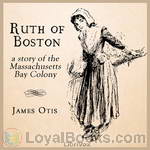 Ruth of Boston: A Story of the Massachusetts Bay Colony
Ruth of Boston: A Story of the Massachusetts Bay Colony
James Otis wrote a series of books depicting life in the new colonies, written from a child’s point of view. Ruth of Boston is the story of 12 year old Ruth, coming from London to live in the Massachusetts Bay Colony. It gives accounts of what a girl’s daily life might have been like during the beginnings of this colony. | |
By: Jane Porter (1776-1850) | |
|---|---|
 The Scottish Chiefs
The Scottish Chiefs
An adventure novel about William Wallace, one of the most popular books ever written by Jane Porter. The French version was even banned by Napoleon, and the book has remained very popular with Scottish children, but is equally enjoyable for adults. | |
By: John A. Joyce | |
|---|---|
 Shakspere: Personal Recollections
Shakspere: Personal Recollections
Recording of Shakspere: Personal Recollections, by John A. Joyce.A fictitious account of a "friend" of William Shakespeare, who accompanies him from his birth to his death and beyond, chronicling Shakespeare's life, adventures, speeches, and impromptu bursts of poetry. | |
By: John Ackworth (1854-1917) | |
|---|---|
 Doxie Dent
Doxie Dent
Following the short story collections, Clog Shop Chronicles and Beckside Lights, John Ackworth completed the adventures of clogger Jabez Clegg and his Beckside cronies with a novel. Jabez's niece, the young and vivacious Doxie Dent, has grown up in 'Lunnon'. Arriving in the Lancashire village that is cloggers home, she delights the villagers with her southern ways, but Jabez remains unimpressed... | |
By: John Dos Passos (1896-1970) | |
|---|---|
 Three Soldiers
Three Soldiers
Three Soldiers, the second novel by John Dos Passos, follows the experiences of several young Americans thrown into the confusion and brutality of World War I.Written when the author was just twenty-three, it was key to the development of a realistic depiction of war in American literature, and earned Dos Passos, later named by Jean-Paul Sartre "the greatest living writer of our time", important early attention.Critic H L Menken said of it: "no war story can be written in the United States without challenging comparison with it--and no story that is less meticulously true will stand up to it... | |